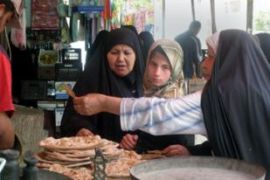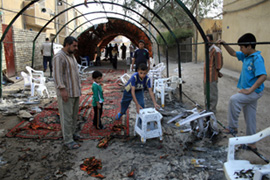Curfew partially lifted in Baghdad
Restrictions lifted after Shia leader orders al-Mahdi Army to withdraw from streets.

However, restrictions remained in place in three predominantly Shia neighbourhoods, including Sadr City.
James Bays, Al Jazeera’s correspondent in Baghdad, said on Monday that al-Sadr’s fighters were observing his order to stay off the streets.
But although civilians have ventured out on to the streets of the capital they remain nervous that fighting will flare up again, he said.
Negotiations held
 |
| The fighting has severely disrupted the lives of Iraqi civilians in Sadr City [AFP] |
The government welcomed al-Sadr’s decision, which followed intense negotiations involving al-Sadr himself, Al Jazeera understands.
Nuri al-Maliki, Iraq‘s prime minister, called al-Sadr’s statement “a step in the right direction”.
Al-Maliki had personally supervised the operation in Basra against the militias.
“We came here [to Basra] to pursue criminal gangs and murderers … our forces were not ready for this battle and we were surprised,” he told al-Iraqiya, a state television service, on Monday.
“All those who continue to carry weapons and posses heavy weapons will be our target.”
Government warning
| Profile |
The main elements of the plan were that al-Sadr’s al-Mahdi Army forces should leave the streets in return for the Iraqi government’s guarantee that it would not arrest the group’s fighters unless they have arrest warrants for them, Bays said.
Ali al-Dabbagh, an Iraqi government spokesman, told the Reuters news agency on Sunday that despite al-Sadr’s order, Iraqi troops would continue military operations against “criminals” in Basra.
Fighting persists
Fighting continued in the Basra area in the immediate wake of al-Sadr’s announcement on Sunday, but there were no serious clashes overnight.
Seven people were killed on Sunday when a mortar struck a residential district in Baghdad‘s Karradah district.
Witnesses also reported clashes in the Shula area in a northern section of the capital.
The US military said it killed 25 suspected fighters in an air raid on Sunday after American ground forces came under heavy fire in predominantly Shia eastern Baghdad.
Another 16 “criminals” were also killed by US forces in a series of incidents, half of those in northeast Baghdad, US military statements said.
British role
